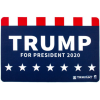Mark Smith, a constitutional attorney and host of the “Four Boxes Diner” on YouTube, recently discussed the significant constitutional and legal questions arising from the Supreme Court’s consideration of a case involving former President Donald Trump.
This case, which deals with the scope of presidential immunity, has broader implications for the interpretation of executive power and, indirectly, the Second Amendment rights. Here, we delve deeper into the interconnectedness of this case with broader constitutional doctrines and what it might mean for the future of presidential authority and individual rights.
Presidential Immunity and the Balance of Powers
Presidential immunity is a doctrine designed to ensure that while in office, and possibly thereafter, presidents can perform their duties without the constant threat of litigation. This immunity, however, is now under scrutiny in the courts due to actions taken by Trump during his presidency, specifically related to the events of January 6, 2021. The Supreme Court’s decision in this case could redefine the boundaries of executive power, influencing how future presidents can act and be held accountable.
The Special Prosecutor’s Authority
One of the pivotal aspects of the case that Smith highlights is the legitimacy of the special prosecutor, Jack Smith. The argument, as presented, questions whether Jack Smith had the proper authority to prosecute, given that he was neither nominated by a president nor confirmed by the Senate. This challenges the foundation of his actions against Trump, potentially nullifying the proceedings if the Court finds in favor of this argument.
Implications for the Second Amendment
While the case directly concerns presidential immunity, its outcomes could ripple through various facets of American law, including the Second Amendment. The Second Amendment, protecting an individual’s right to keep and bear arms, often intersects with federal authority and constitutional interpretations. A broad or restricted interpretation of presidential powers might influence future legislative and judicial attitudes toward gun ownership and individual rights.
Live Inventory Price Checker
 |
TekMat Trump for President 2020 11"x17" Gun Cleaning Mat - TEK-17-TRUMP-2020 | Bereli | $ 10.95 | |
| TekMat President Trump Gun Cleaning Mat / Mouse Pad | TekMat | $ 13.99 | ||
 |
AUTO ORDNANCE TRUMP | Guns.com | $ 2854.99 | |
 |
AUTO-ORDNANCE 1911 Trump Rally Cry 45 ACP 5" 7rd Pistol w/ Night Sights | Donald J Trump Engraving | KYGUNCO | $ 1547.99 |
The Role of the Supreme Court
The Supreme Court’s approach to this case will be closely watched for several reasons. Firstly, it will clarify the extent to which former presidents can be held liable for actions taken while in office. Secondly, it will test the balance of powers among the three branches of government. The questions and comments from the justices during the proceedings will provide insight into their views on these fundamental constitutional issues.
Broader Constitutional Context
This case is more than just about Donald Trump’s legal liabilities; it’s about how the highest law of the land is interpreted and applied. The decisions made here will likely impact how future administrations are conducted, the legal liabilities of those in the highest office, and how other constitutional rights, such as the Second Amendment, are understood in the context of overarching presidential powers.
Conclusion
As we await the Supreme Court’s decision, it is crucial to understand the profound implications this case holds for the U.S. constitutional framework. It challenges us to consider how laws apply to those at the highest level of power and how these rulings affect the everyday rights of American citizens, including their Second Amendment rights. The outcome of this case could redefine the scope of presidential authority for generations to come.
Stay tuned as we continue to provide updates and analyses on this pivotal case, ensuring our readers are the most informed about the intersections of constitutional law and individual rights.
from https://ift.tt/P7aD9QO
via IFTTT

No comments:
Post a Comment